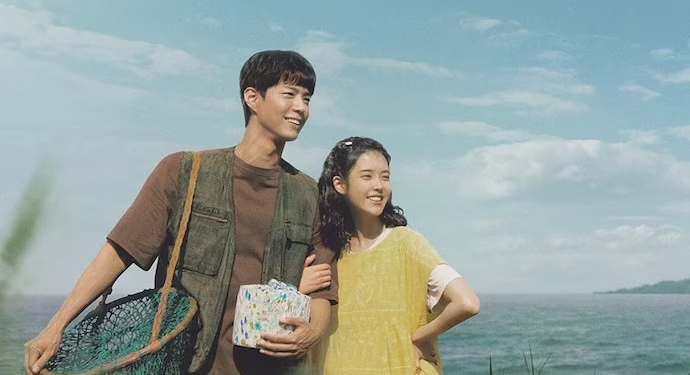The moment it premiered on Netflix in early 2025, When Life Gives You Tangerines became more than just another romantic drama—it became a phenomenon. Starring two of Korea’s most beloved actors, IU and Park Bo-gum, this gentle, melancholy, and visually rich series about second chances, regrets, and rural life has already topped global charts.
But what is it about Tangerines that resonates so deeply with viewers around the world? Is it the magnetic chemistry between the leads? The haunting score? The fog-drenched landscapes of Jeju Island? Or perhaps, it’s the slow, deliberate pacing that reminds us love doesn’t always arrive in grand moments—but in quiet, persistent warmth.
Let’s dive deep into why When Life Gives You Tangerines is 2025’s must-watch Korean romance—and why it’s anything but predictable.
A Story About What Could Have Been
When Life Gives You Tangerines tells the story of Yoon Hye-jin (IU), a burned-out Seoul-based pianist who reluctantly returns to her hometown in Jeju after suffering a public career setback. What was meant to be a brief stay becomes something more complicated when she crosses paths with Lee Joon-oh (Park Bo-gum), a childhood friend turned widowed tangerine farmer.
The two reconnect through subtle moments—a shared umbrella, a piano melody heard through open windows, a late-night trip to the cliffside lighthouse. Their dynamic is restrained yet intense, full of unspoken apologies and lingering glances. Hye-jin carries the guilt of leaving, while Joon-oh harbors questions he was never brave enough to ask.
As the story unfolds over ten episodes, viewers are taken on a reflective journey that’s more about healing and forgiveness than traditional romance tropes. There are no love triangles, evil exes, or dramatic confessions. Instead, the series is rooted in realism—emotions evolve gradually, with every scene laced in nostalgia, longing, and seasonal change.
IU and Park Bo-gum: The Heart of the Drama
Much of the show’s success rides on the shoulders of its two leads—and they absolutely deliver.
IU proves, once again, that she’s far more than just a singer. As Hye-jin, she captures the fragility of a woman who has spent her entire life running—from her past, her grief, and her own emotional needs. Her performance is subtle but piercing; she speaks volumes even in silence. Her expressive eyes, especially in the scenes where she plays piano after years of avoiding it, reveal layers of regret and resilience.
Park Bo-gum, in contrast, brings a warm, earthy charm to Joon-oh. It’s one of his most mature roles to date. As a former city architect who gave it all up for farm life after his wife’s tragic death, Joon-oh is a man who has made peace with his solitude—until Hye-jin returns. Bo-gum plays him with a quiet dignity, and when his emotions finally crack through his stoic surface, it’s genuinely moving.
Together, IU and Bo-gum share a chemistry that feels lived-in. It’s not fireworks—it’s a slow burn. A comfortable silence. A glance across a marketplace. And that makes it all the more powerful.
Jeju Island: A Living Character
Set entirely on Jeju Island, the show uses the island not just as a backdrop but as a living, breathing character. Director Yoon Ji-won leans into wide landscapes, crashing waves, misty roads, and the tangerine orchards that glow golden under the winter sun.
The cinematography is breathtaking—particularly the shots at dawn, where characters walk alone down empty coastal trails. Every visual detail, from the rough texture of hand-picked citrus to the flickering warmth of kerosene lamps, contributes to the story’s quiet atmosphere. The changing seasons echo the emotional shifts between Hye-jin and Joon-oh.
The use of real Jeju dialect and cultural traditions adds authenticity without forcing exposition. Whether it’s making dried persimmons or lighting incense at a family grave, every gesture is loaded with meaning.
A Soundtrack That Hurts (In a Good Way)
The OST of When Life Gives You Tangerines deserves its own award. Composed by Nam Hye-seung (known for Crash Landing on You and Goblin), the music is atmospheric, melancholic, and deeply emotional.
The recurring piano motif—composed to reflect Hye-jin’s internal conflict—is both beautiful and haunting. When layered over scenes of her walking past her old music school or listening to Joon-oh talk about his late wife, the emotion becomes almost unbearable.
Several of the songs have already climbed the Melon charts, especially “Bitter Sweet Tangerine”, a duet performed by IU and indie artist 10cm. The lyrics, full of metaphor and sorrow, perfectly reflect the series’ core themes: what we give up to survive, and what we return for once we’re ready to feel again.
Strengths and Subtle Brilliance
When Life Gives You Tangerines doesn’t rely on plot twists. Its brilliance lies in nuance.
- Strong characterization: Both leads feel real and flawed. Even supporting characters, like the gossiping aunties or the teenage niece with dreams of leaving Jeju, are grounded and human.
- Pacing with purpose: Some viewers may find the drama slow, especially in the first few episodes. But like farming or grieving, the show teaches us that some things simply take time.
- No manufactured conflict: There’s no big villain, no shock death, no cartoonish jealousy. Every obstacle feels organic and emotionally honest.
In short, it trusts the audience to be patient—and rewards them with emotional depth.
Critic and Fan Response
Upon release, When Life Gives You Tangerines received critical acclaim across the board.
- The Korea Herald called it “a soft masterpiece—one that replaces K-drama cliché with true emotion.”
- New York Times Asia described it as “gentle and devastating,” highlighting IU’s performance as “career-defining.”
- On Netflix, the show trended top 3 globally in its debut week and gained particular traction in Southeast Asia, Japan, and Brazil.
Online communities, especially on Reddit and TikTok, have been flooded with edits, fan art, and even tangerine-themed food inspired by the show. Viewers relate to the core theme of revisiting unresolved parts of life—and are finding comfort in the show’s gentleness.
Flaws, if Any?
No show is perfect—and Tangerines has minor drawbacks.
- The first two episodes may feel slow to viewers used to faster-moving dramas. The story takes its time to unfold.
- Flashback-heavy structure: Some viewers might find the past-to-present transitions disorienting, especially as certain memories are intentionally withheld until later episodes.
- Limited scope: Unlike dramas with sprawling casts or international intrigue, Tangerines keeps its world small. This is a strength to many—but a limitation to those expecting high drama.
Still, these issues are more about expectations than execution. If you come for a meditative, emotional journey, you’ll leave fulfilled.
Final Thoughts
When Life Gives You Tangerines is not your typical K-drama romance. It doesn’t race toward a happy ending. It invites you to sit, reflect, and maybe cry a little as you watch two people rediscover what it means to feel again.
IU and Park Bo-gum give unforgettable performances, the direction is graceful, and the writing never underestimates its audience. At its core, it’s a story about how people come undone—and how, sometimes, they stitch themselves back together in the least likely places.
If your heart needs something tender, honest, and slow as a sunrise, don’t miss this drama.
Rating: ★★★★★ (5/5)





















